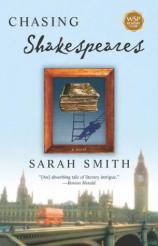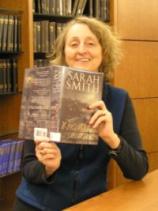Reading Group Guide
Discussion Questions
Chasing Shakespeares: A Novel

1. "Shakespearean is a word, like love," Joe says. Why are readers so fascinated by Shakespeare?
2. "Print the legend," Posy tells Joe. She's quoting from John Ford's film The Man Who Shot Liberty Valance. Shakespeare's traditionally accepted life is a powerful myth of genius, an ordinary man creating great poetry. Is the legend as important as "the truth"?
3. "God is a librarian," says Katherine Darnell, and tells the extraordinary story of the discovery of Blake's manuscripts. The story isn't all true, and the story about Elizabeth waiting in the park at Hatfield probably isn't true, but Sarah Smith uses both legends in Chasing Shakespeares. Do these legends have anything to do with the Shakespeare myth?
4. A big theme in this book is parents and children. Joe Roper and Henry Roper, Posy and Ted Gould, Posy and her absent mother, Edward de Vere and his father, Edward de Vere and his father-in-law William Cecil, William Cecil and Robert Cecil, Edward de Vere and Susan de Vere, and even, possibly, Oxford and his potential son-in-law Southampton. Of all the characters, only Mary Cat doesn't have a family life; she has a "mother house" instead. Why the theme, and why is Mary Cat an exception?
5. God, fate, coincidence, and that other kind of deus ex machina, genius, play big roles in Chasing Shakespeares. Does this bother you? Why or why not? Does it make any difference that the evidence that Joe gets is supposedly real evidence?
6.Is Chasing Shakespeares a historical novel? Is it a mystery? Is it "true crime"?
7. Who do you think wrote the plays? Is it important who wrote the Shakespeare plays?
8. Do you think Joe actually found a Shakespeare poem? An Oxford poem? Are they the same? Does what you think of the poem make a difference to what you think of the book?
9. Joe argues that Shakespeare writing in 1580 wouldn't sound like Shakespeare. Do you agree? What makes "Shakespeare"?
10. Do people change fundamentally from age to age? Are the concerns of national political figures like the Cecils fundamentally different from those of entertainers like the Goulds? Can we understand the Cecils through the Goulds?
11. In the last scene of the book, Joe says that the Goscimers have seen Stratford through the eyes of post-World War II intellectual Boston. Joe himself sees Stratford, and Shakespeare, through the eyes of East Bradenton, Vermont. What are the advantages and disadvantages? The New Historicist movement argues that you can see the past in other ways. Can you ever really see a historical period through eyes "not your own"? How?
12. Who should Joe end up with, Posy or Mary Cat (or neither)?
Chasing Shakespeares: A Novel
- Publication Date: May 18, 2004
- Paperback: 352 pages
- Publisher: Washington Square Press
- ISBN-10: 0743464834
- ISBN-13: 9780743464833








